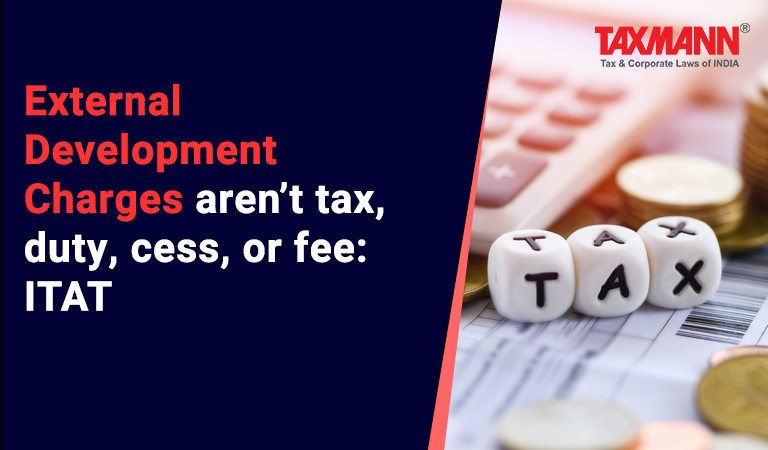External Development Charges aren’t tax, duty, cess, or fee: ITAT
- Blog|News|Income Tax|
- 2 Min Read
- By Taxmann
- |
- Last Updated on 11 October, 2022

Case Details: Vipul Ltd v. DCIT - [2022] 143 taxmann.com 105 (Delhi-Trib.)
Judiciary and Counsel Details
-
- C.M. Garg, Judicial Member & Pradip Kumar Kedia, Accountant Member
- Sidhant Arora, CA for the Appellant.
- Ramdhan Meena, Sr. DR for the Respondent.
Facts of the Case
The assessee was a corporate entity engaged in real estate business operating in Haryana. The assessee incurred some External Development Charges (EDC) payable to Haryana Urban Development Authority (HUDA). During the assessment, the Assessing Officer (AO) disallowed EDCs incurred by invoking section 43B, claiming it to be in the nature of the tax, duty, cess, or fees or by whatever name called.
On appeal, the CIT(A) confirmed the order of AO. Aggrieved-assessee filed the instant appeal before the Delhi Tribunal.
The Tribunal relied upon the judgment passed by the Hon’ble Supreme Court in the case of CIT vs. McDowell & Co. 180 Taxmann 514 (SC). The SC held that under Article 366(28) of the Constitution, ‘Taxation’ has been defined to include the imposition of any tax or impost whether general or local or special and tax shall be construed accordingly.
Thus, the expression ‘Duty, Taxes, Cess or fees or by whatever name called’ should be construed in the limited range of the same kind.
ITAT Held
The Tribunal held that the word ‘fee’ in section 43B(a) is to be interpreted ‘ejusdem generis’, the words “tax”, “duty” and “cess” preceding it. When so interpreted, it would be clear that EDC is not a ‘fee’ for the purpose of section 43B(a) as it is amply clear from HUDA Rules that it is a charge paid for obtaining the services from the HUDA authority like sewage, roads, lighting, etc. In case the assessee does not avail of such facility, he is entitled to refund or adjustment of payment.
Accordingly, as the payment is made against the facilities availed by the developer, EDC cannot be put in the basket of mandatory or compulsory payment of duty, tax, cess, or fee. Therefore, section 43B does not stand attracted in the present case to the payment of EDC by the assessee.
Disclaimer: The content/information published on the website is only for general information of the user and shall not be construed as legal advice. While the Taxmann has exercised reasonable efforts to ensure the veracity of information/content published, Taxmann shall be under no liability in any manner whatsoever for incorrect information, if any.

Taxmann Publications has a dedicated in-house Research & Editorial Team. This team consists of a team of Chartered Accountants, Company Secretaries, and Lawyers. This team works under the guidance and supervision of editor-in-chief Mr Rakesh Bhargava.
The Research and Editorial Team is responsible for developing reliable and accurate content for the readers. The team follows the six-sigma approach to achieve the benchmark of zero error in its publications and research platforms. The team ensures that the following publication guidelines are thoroughly followed while developing the content:
- The statutory material is obtained only from the authorized and reliable sources
- All the latest developments in the judicial and legislative fields are covered
- Prepare the analytical write-ups on current, controversial, and important issues to help the readers to understand the concept and its implications
- Every content published by Taxmann is complete, accurate and lucid
- All evidence-based statements are supported with proper reference to Section, Circular No., Notification No. or citations
- The golden rules of grammar, style and consistency are thoroughly followed
- Font and size that’s easy to read and remain consistent across all imprint and digital publications are applied



 CA | CS | CMA
CA | CS | CMA
